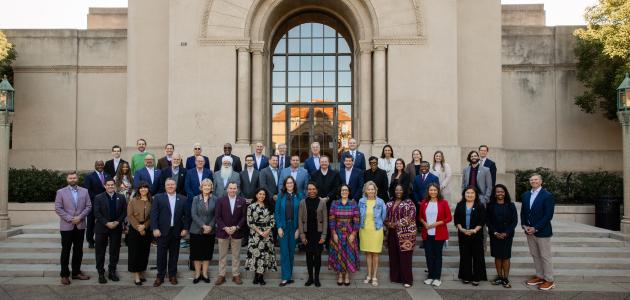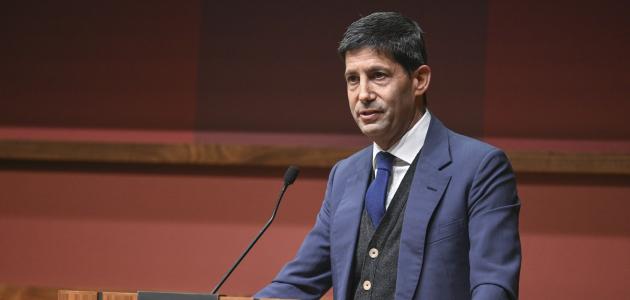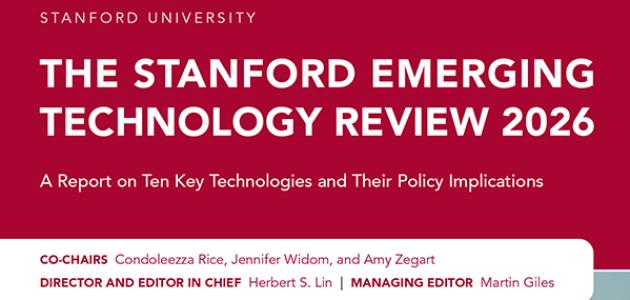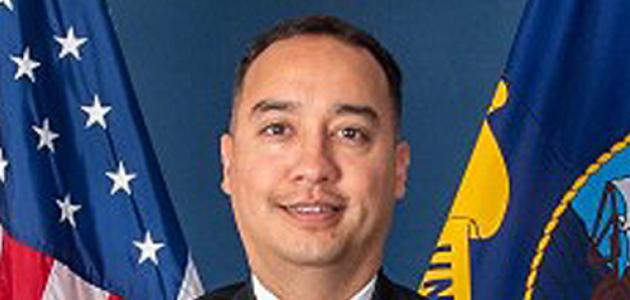In his overview of the Hoover Institution at this year's Board of Overseers meeting, John Raisian, Hoover director, spoke of Hoover's accomplishments and plans for growth.
Raisian pointed to the remarkable success of the Koret Task Force on K–12 Education in developing the American Education Institutions initiative, an approach, according to Raisian, that could be a model for the other initiatives. In its first year the task force produced edited works and some op-eds for publication. Now going into its seventh year, in addition to edited works and op-eds, task force members produce a quarterly magazine, Education Next, appear regularly on radio and television, advise state governments on education reform, and provide testimony to Congress.
This year's meeting, during July 13 and 14, included talks by Hoover fellows and editors from the Wall Street Journal. Topics included the importance of the West's engagement in Iraq, the United States monetary policy and economic outlook, obstacles to public policy making, the work of the library and archives, children's literature, and the consequences of bad information.
"In the 1990s [the West] relaxed, we thought the challenges had been turned back," said Charles Hill, Hoover research fellow. "We thought we saw a peace dividend, and, in the course of this neglect, we let the international state system deteriorate." Hill and Hoover senior fellow Victor Davis Hanson presented their views on the United States involvement in Iraq in the first session, "What's Really at Stake in Iraq."
Coverage of recent acts by terrorists that has many calling for withdrawal from the Middle East suggests that the media do not understand what is going on, Hill said. He listed acts by terrorists going back to the early twentieth century. "Whatever is going on is not because we are in Iraq today," Hill said. He attributes terrorism to the desire on the part of the perpetrators to oppose the international system of states. Hill stated that Islamic terrorists are trying to destroy the current system so as to replace it with their own system. He concluded by saying we have not had a religious war in centuries and "that our system is not designed to handle it, our laws are not designed to handle it, our minds are not designed to handle it, and the idea of religious war is so appalling that we do not want to talk about it openly."
Next, Hanson outlined the wars that the United States and its allies have fought in the Middle East since the early 1990s. The first one, in 1991, referred to as the Gulf War, had the wrong objective, Hanson said; it should not have been solely about Saddam Hussein in Kuwait but rather who Saddam Hussein was. This first war was followed by the No-Fly-Zone-War or what then secretary of state Madeleine Albright called keeping "Saddam in his box." During March and April 2003 the United States and its allies returned to remove Saddam Hussein. This third conventional war, Hanson said, did not address the root causes that he identified as "a Soviet-style Baathist socialism imposed by force on a tribal society that had led to a failed state." Now, since April 2003, the United States has been engaged in a fourth war to make sure there are no more dictators like Saddam Hussein in Iraq by staying on and introducing democratic reform. "The fourth war is for all the marbles," Hanson said. He went on to explain that, if the United States loses, it will get out and not return, and Iraq will become a Baathist or theocratic stronghold, which the terrorists recognize as a safe haven. On the other hand, if the United States wins and Iraq becomes a democracy, Hanson said, "there will be no need to fight a fifth war."
In his overview of "U.S. Monetary Policy and Economic Outlook" Robert Barro, Hoover senior fellow and Harvard economist, had a generally optimistic outlook that was marred only by a lack of fiscal discipline, especially in regard to expenditures. He repeated a quote, circulating in Washington, D.C., "that Ronald Reagan proved budget deficits don't matter," but Barro believes that it's better if people think budget deficits are terrible because then they have a lot of incentive to hold down expenditures.
In "Why Washington Doesn't Work—and Why it Matters" Alan Murray, an assistant managing editor at the Wall Street Journal, said that during his 25 years in Washington, D.C., "the political culture of Washington has gone steadily downhill." The decline in civil relations among Washington leaders, Murray believes, hinders public policy development. "Some view gridlock as great," Murray said, that "nothing bad can happen if nothing happens" The obvious rebuttal to that he pointed out is September 11, but there are also business concerns. "Increasing reliance on markets," Murray added, "requires increasing leadership coming out of Washington."
Anatol Shmelev, a curator and Hoover research fellow, exhibited forged documents from the archives in his presentation "Imposters in the Archives: Unmasking Forged Documents and Political Intrigue." The documents on display included falsified passports to establish identities for spies, photographs that were retouched to remove people to revise history, and textbooks based on lies to promote the racist views of government leaders. The materials are kept, Shmelev said, for researchers who can better understand the context and to uncover and expose these falsehoods.
In "Uncle Sam I Am: Dr. Seuss and the American Identity (a Not Entirely Frivolous Look at How Good Children's Books Make Good Citizens)," Tunku Varadarajan, Wall Street Journal editorial features editor, discussed how American children's books influence and reflect our national character.
The value of information we receive through media outlets was questioned by Daniel Henninger, Wall Street Journal deputy editor, in "A Gresham's Law of Information: Is Bad Information Driving Out Good Information?" Beginning in the 1970s, Henninger said, newspapers added more analysis to their coverage in order to compete with television, which had eroded their readership. The result, he said, "is that there's not much news on the news."
The dinner speaker was social and political satirist Christopher Buckley. Buckley, the renowned author and editor of Forbes FYI, amused the audience with non sequiturs on a variety of subjects.













